Automation software can help you go from no data to actionable insights at lightning speed (without burnout). But finding the right tool can be a bumpy ride.
With countless options, overlapping features, and endless “This is the best!” claims, it’s overwhelming. That’s why we created this guide to help you:
- Spot the key features in market research automation software
- Explore the top tools and what makes them worth your time
No more researching the research tools — just pick your favorite and get started.

TL;DR — 5 Market Research Automation Software
Market research involves many moving parts. Different software automates specific aspects of the process. Below, we review five of the best tools and their key use cases:
- Marvin for qualitative research automation
- Qualtrics for a comprehensive, all-in-one research suite
- Semrush Market Explorer for competitor analysis and audience insights
- Brandwatch for social listening and sentiment analysis
- Medallia for collecting and acting on customer feedback
Need just one tool for starters? Pick our AI-powered qualitative research assistant. Marvin is a research repository packed with automated workflows. It’s easy to use for everything from small data sets to thousands of surveys or customer insights.
Create a free account today to see how Marvin accelerates your qualitative research, helps quantify it, and pulls out actionable insights.

What is Market Research Automation Software?
Any tool that speeds up research and delivers smarter insights falls under the automation software umbrella. These tools typically:
- Use advanced tech, such as AI or machine learning
- Uncover insights you might miss on your own
- Handle large volumes of information
- Automate repetitive tasks
Market research automation software focuses on one or more of the following areas:
- Data collection: Automates surveys, tracks online mentions, or gathers real-time product feedback
- Analysis: Processes data using algorithms to reveal trends, patterns, and connections
- Segmentation: Groups your audience by behavior, preferences, or demographics
- Integration: Syncs with dashboards and collaboration platforms to centralize research

Benefits of Market Research Automation
Automation can transform your entire research process, helping you make confident, data-driven decisions at every step. Here’s how:
- Accelerates insights: The software processes large data sets quickly. For example, it can perform survey analysis on thousands of responses in a few hours.
- Improves accuracy: Machine learning spots subtle trends or anomalies, such as a drop in user satisfaction tied to a specific feature.
- Streamlines workflows: Tools like Marvin integrate various tasks, from collecting feedback and tagging themes to generating reports.
- Enables real-time action: Live data processing (for instance, during feature rollouts or onboarding) lets you respond to user pain points before they escalate.
- Supports mixed data: Automation bridges quantitative research and qualitative research. For example, it can link open-ended feedback to metrics such as Net Promoter Scores.
- Prioritizes action: Some tools pre-organize insights by importance so you can focus on the areas that drive the most value first.
- Adapts to complexity: Whether you’re running a pilot project or managing global feedback, it handles the workload without breaking a sweat.

How to Choose the Right Market Research Automation Tool
The “right” tool is the one that aligns with your goals and workflows. Here’s how to spot it:
- Start with your goals: Define what you need. Is it better surveys, faster analysis, or insights from user feedback? Focus on tools tailored to those tasks.
- Check compatibility: Make sure the software integrates seamlessly with your team’s apps, such as Figma or your CRM. Integration saves time and boosts collaboration.
- Evaluate features: Match the tool’s capabilities to your research methods. For example, if you rely on interviews, look for automatic transcription and tagging.
- Consider scalability: Choose software that grows with you. You may be only surveying a few users now, but as your needs evolve, the tool must keep up.
- Prioritize usability: Pick something intuitive and easy to learn. Even the most powerful tool falls flat if your team can’t figure it out.
- Review automation power: Assess how much work it removes. Does it tag themes, generate reports, or uncover patterns without manual effort?
- Test support: Strong customer service is a must. Quick help is priceless when deadlines loom or technical issues arise.

Best Market Research Automation Software
Automation is meant to save time, not waste it. But with so many tools out there, you could spend days just deciding where to begin. To make things easier, we’ve narrowed it down to five standout options. Read on to see:
- Why these tools are worth your attention
- How they can transform your research process
1. Marvin (Qualitative Research Automation)
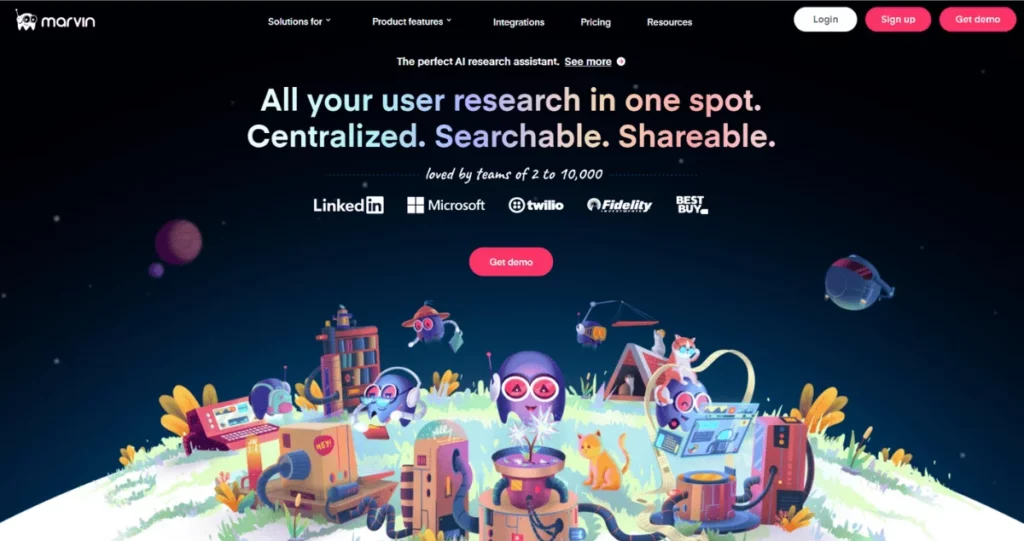
Marvin is our AI-powered research repository and a powerhouse for qualitative data analysis. It also bridges the gap to quantitative research by helping you quantify qualitative data.
Consider Marvin for:
- AI note-taking: Generates time-stamped notes during user interviews.
- Automated transcription: Records and transcribes calls, saving time.
- Automated tagging: Applies tags and organizes your insights into themes.
- Survey analysis: Analyzes thousands of survey responses, performing NPS and trend analysis.
- Pattern and trend recognition: Automatically identifies correlations and trends in your data.
- Insights summaries: Summarizes key themes from conversations and surveys.
- Advanced search: Leverages AI-powered search to quickly locate relevant data within the repository.
- Integration-driven automation: Syncs with various tools (Notion, Miro, Google Sheets, etc.).
Want to see how Marvin can transform your market research process? Book a demo today, and experience the power of AI-driven automation for qualitative and quantitative insights.
2. Qualtrics (All-in-One Market Research Suite)
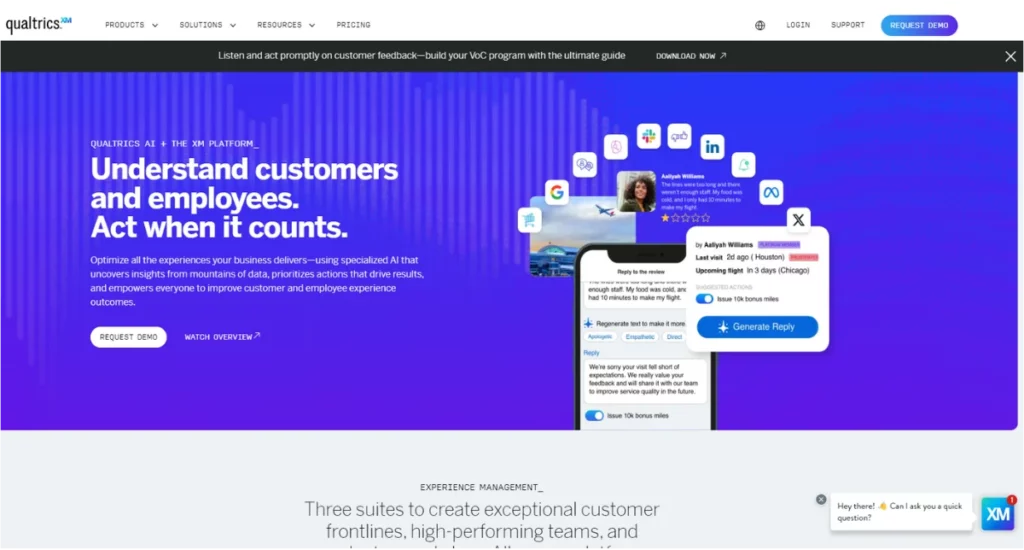
As an experience management software, Qualtrics offers robust tools for survey creation, data analysis, and predictive insights. It’s one of the most complex platforms out there, with automation features including:
- Survey builder: Creates advanced surveys in minutes and quickly analyzes the results.
- Automated segmentation: Uses machine learning to discover untapped customer segments and prioritize high-value opportunities.
- Conjoint analysis: Automatically determines the optimal product configurations and price points with predictive insights.
- Advanced analytics: Uses AI and machine learning for cluster analysis, sentiment detection, and actionable insights from data.
- Data integration: Synchronizes customer profiles and insights with CRM, email, and marketing platforms to enhance decision-making.
3. Semrush Market Explorer (Competitor and Market Analysis)
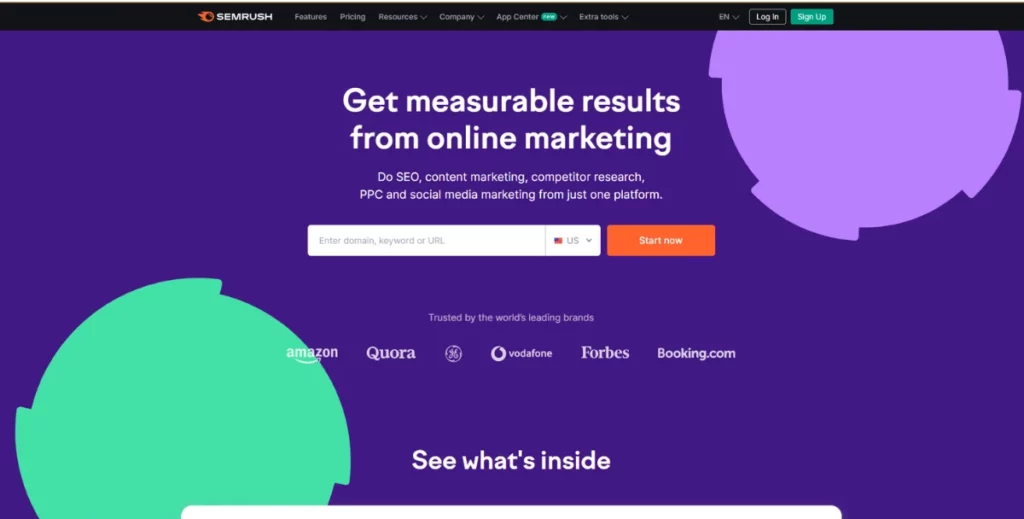
Semrush’s Market Explorer tool tracks market trends and analyzes competitors. It provides insights into audience behavior, industry benchmarks, and growth opportunities, helping with automatic:
- Market landscape outlining: Explores a market and maps out the competitive landscape starting from a website’s URL.
- Market trends analysis: Tracks and forecasts trends across industries.
- Competitor performance monitoring: Identifies competitors’ market share and growth strategies.
- Audience behavior insights: Analyzes audience preferences and demographics for targeted strategies.
- Custom market segmentation: Segments competitors based on various performance metrics.
4. Brandwatch (Social Listening and Sentiment Analysis)
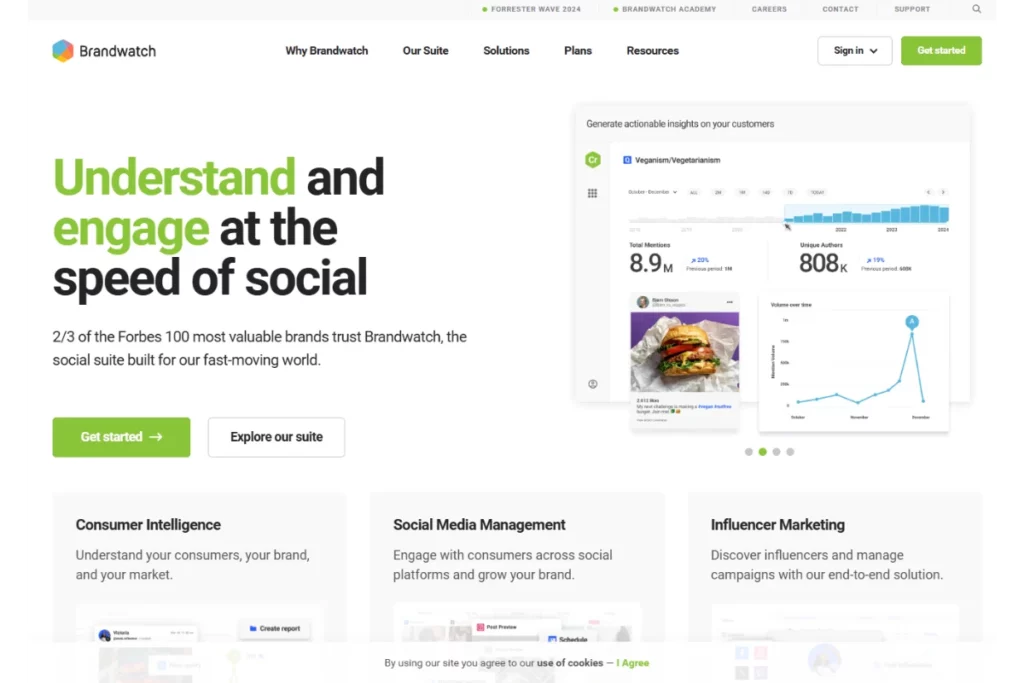
If you’re researching to guide your brand messaging and maintain a positive online presence, Brandwatch can help. It focuses on monitoring social media and understanding brand perception with key automation features:
- Social listening: Monitors brand mentions and customer opinions in real time.
- Trend detection: Tracks emerging topics and conversations across platforms.
- Customizable alerts: Sends automated notifications for critical changes in brand sentiment or online conversations.
- Auto audience segmentation: Groups users by behavior, preferences, or demographics.
- Image analysis: Detects logos, objects, and actions in images.
5. Medallia (Customer and User Feedback Research)
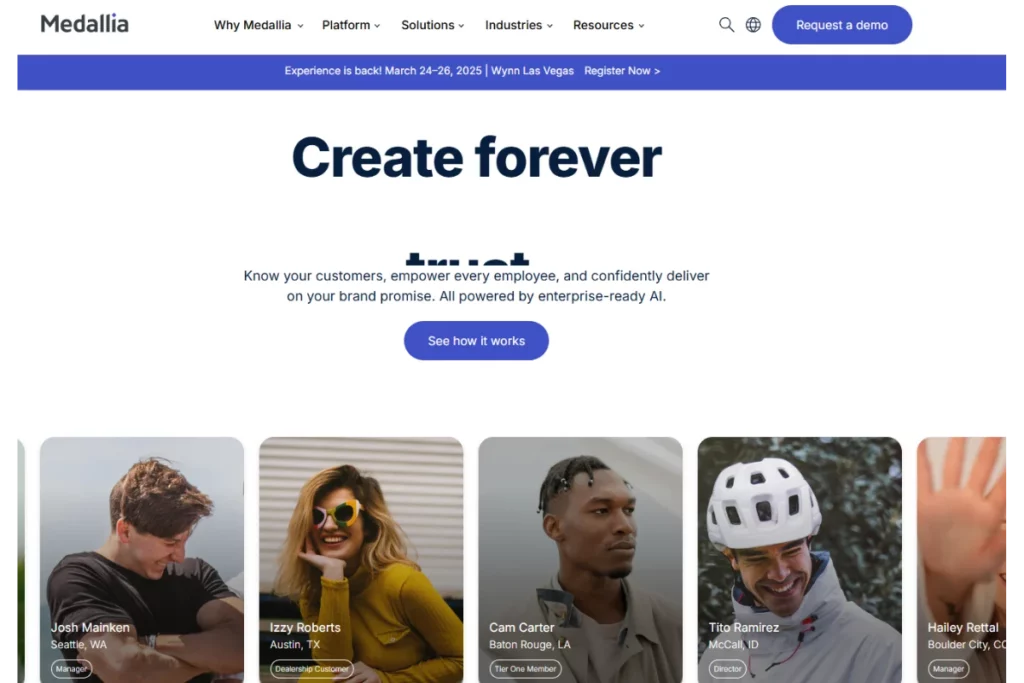
Medallia is a platform for gathering and analyzing customer feedback across multiple touchpoints. It automates experience management and provides actionable insights through:
- Real-time feedback collection: Gathers responses across email, mobile, and social channels.
- Sentiment detection: Automatically identifies emotions in customer feedback.
- Predictive analytics: Uses AI to highlight potential issues before they arise.
- Workflow integration: Routes feedback to relevant teams for quick action.
Top Use Cases of Market Research Automation Software
Market research automation does more than save time. It helps you tackle complex problems with clear, actionable insights. Top use cases include the following:
- User feedback analysis: Go beyond tagging themes. Use customer research software to compare feedback across channels, such as surveys and app reviews. Spot recurring frustrations or requests tied to specific features.
- Feature prioritization: Tie qualitative data, like user comments, to metrics such as Net Promoter Scores. This way, you see which features drive satisfaction and which need fixing.
- Competitor analysis: Automate benchmarking to see where your product lags or leads. Discover trends your competitors are acting on and evaluate how to stay ahead.
- Audience segmentation: Use machine learning to find hidden patterns in user behavior. For instance, group users by how they interact with certain flows or features.
- Concept testing: Simulate user scenarios with advanced analytics. Track reactions to prototypes, from first impressions to deeper usability insights.
Marvin supports these use cases and streamlines your qualitative research through:
✔ Advanced AI
✔ Robust tagging hierarchies
✔ Smart workflows that integrate seamlessly with your tools
From automating analysis to creating shareable insights, it transforms your UX research into an efficient, end-to-end process.
Create a free account today to see how Marvin can simplify your research while delivering deeper insights.

Challenges in Adopting Market Research Automation Platforms
Like any change, switching to market research automation is not without challenges. Here’s what you should consider to sidestep pitfalls and enjoy a smooth transition:
- Learning curve: Advanced tools often come with loads of features, which take time to master. Without proper training, your team may struggle and waste time instead of saving it.
- Integration issues: Not all platforms play nice with your existing tools, whether CRM systems or design software. Integration hiccups can disrupt workflows and create bottlenecks.
- High upfront costs: Advanced automation tools can require significant investment, which may be tough if you have a smaller team.
- Data quality concerns: Automation relies on clean, complete data. Messy inputs lead to flawed outputs, no matter how smart the software is.
- Team resistance: Moving to automation can face pushback from those comfortable with manual processes. This resistance slows adoption.
- Over-reliance on automation: Automation isn’t a replacement for human expertise. It works best when paired with your critical thinking.

Frequently Asked Questions (FAQs)
Ready to make your pick? Here’s what else you should know about market research automation software.
Are Free Market Research Automation Tools Reliable?
Free tools can be a solid choice for basic tasks, mostly running surveys or organizing data. However, they often have limited features and lack advanced capabilities (AI analysis, seamless integrations, etc.).
While they’re not unreliable, their capacity may not meet the demands of complex research projects.
How Much Does Market Research Automation Software Typically Cost?
Prices can range widely. Entry-level plans often start at $50/user/month, but advanced tiers with premium features can climb significantly.
Costs depend on various factors — automation capabilities, integrations, and the number of users. When choosing, weigh your budget against your specific needs.
What Skills Are Required to Use Market Research Automation Software?
More often than not, you don’t need to be a tech expert to get started. Basic skills — data entry, chart analysis, insights interpretation — are enough.
Most platforms are designed to be user-friendly, with tutorials or support to guide you. For advanced features, some familiarity with research methods or workflows can be helpful, but it’s not essential.

Conclusion
Research should be exhaustive, not exhausting. The right tool can help whether you need better surveys, smarter analysis, or faster feedback. All while freeing you to build experiences your users love.
Ready to streamline your market research? Marvin has you covered. From small projects to massive data sets, its user-friendly platform uses AI to automate data collection, analysis, and reporting.
Create a free account today, and enjoy Marvin’s automated market research features immediately.

